2020 PMLA winners, shortlist and judges
The winners, shortlistees and judges of the 2020 Prime Minister's Literary Awards.
Judges 2020
Nonfiction and Australian history panel
Andrew Tink AM (Chair)
Chris Mitchell AO
Troy Bramston
Dr Deborah Hope
Professor Gail Pearson
Fiction and poetry panel
Suzanne Leal (Chair)
Susan Wyndham
Dr Kerryn Goldsworthy
Professor Philip Mead
Dr Lucy Neave
Children’s and young adult literature panel
Professor Margot Hillel OAM (Chair)
Margrete Lamond
Kirli Saunders
James Roy
Demet Divaroren
Fiction
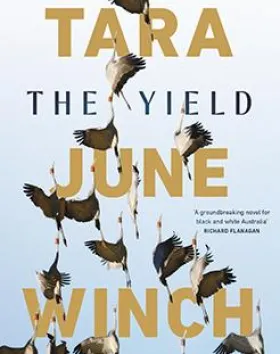
WINNER: The Yield – Tara June Winch
The Yield
WINNER
Shortlist year: 2020
Shortlist category: Fiction
Published by: Hamish Hamilton an imprint of Penguin Random House
Knowing that he will soon die, Albert Gondiwindi takes pen to paper. His life was spent at Prosperous House, on Massacre Plains. Albert is determined to pass on his people's language and everything ever remembered.
August returns home for her grandfather's burial wracked with grief and confronted with the news Prosperous will be repossessed. Her quest to save their land leads her to her grandfather's voice and into the past.
'The Yield' is the story of a people and culture dispossessed, a celebration of what was and what endures, and a powerful reclaiming of Indigenous language, storytelling and identity.
About the author
Tara June Winch
Tara June Winch is a Wiradjuri author, born in Australia and based in France. Her first novel, 'Swallow the Air', was critically acclaimed, winning numerous literary awards. She was named a Sydney Morning Herald Best Young Australian Novelist. In 2008, Tara was mentored by Nobel Prize winner Wole Soyinka as part of the prestigious Rolex Mentor and Protégé Arts Initiative. Her story collection 'After the Carnage' (2016) was longlisted for the Victorian Premier's Literary Award for fiction, and shortlisted for the 2017 NSW Premier's Christina Stead prize for Fiction and the Queensland Literary Award for a collection. 'The Yield' won the 2020 Miles Franklin Literary Award and within the 2020 NSW Premier's Literary Awards has won the Christina Stead Prize for Fiction, the People's Choice Award and Book of the Year.
Judges’ comments
Moving between the past and present, 'The Yield' is the powerfully moving story of a Wiradjuri family from the township of Massacre Plains. Most arresting is the voice of Albert Gondiwindi, whose story is told through entries in his dictionary of Wiradjuri words. That he is now dead, with his long-absent granddaughter August returning home for his funeral, does nothing to diminish the extraordinary reach of his words that leap from the pages, inviting the reader—all readers—to form their sounds and learn their meanings.
Observant and unflinching, Winch deftly intersperses the narrative with letters of a good-hearted, long-deceased church minister as she explores the tragedy of Wiradjuri children removed from their families and homes. Never didactic, Winch carefully and lovingly brings to life the story of a fractured family and their fight to retain their culture, their language and their land. A lyrical and generous writer, Winch's prose shimmers through this extraordinary tale of cruelty, dislocation, love and resilience.
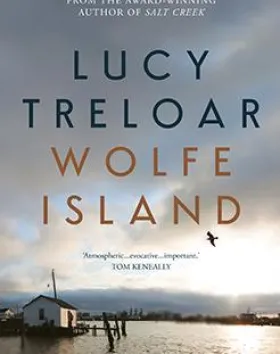
Wolfe Island – Lucy Treloar
Wolfe Island
Shortlist year: 2020
Shortlist category: Fiction
Published by: Picador an importing of Pan Macmillan
Kitty Hawke, the last inhabitant of a dying island sinking into the wind-lashed Chesapeake Bay, has resigned herself to annihilation... Until one night her granddaughter blows ashore in the midst of a storm, desperate, begging for sanctuary. And when trouble comes following her granddaughter, no one is more surprised than Kitty to find she will fight to save her as fiercely as her name suggests...
A richly imagined and mythic parable of home and kin that cements Lucy Treloar's place as one of our most acclaimed novelists.
About the author
Lucy Treloar
Lucy Treloar is the author of 'Salt Creek', which won the Indie Award for Best Debut, the ABIA Matt Richell Award and the Dobbie Award, and was shortlisted for prizes including the Miles Franklin Literary Award and the UK's Walter Scott Prize. A graduate of the University of Melbourne and RMIT, Lucy works as a writer and editor, in Australia as well as Cambodia, where she lived for a number of years. In between writing, Lucy teaches creative writing at RMIT and Writers Victoria.
Judges’ comments
In 'Wolfe Island' Lucy Treloar creates a disturbing and credible dystopian future. Reclusive artist Kitty Hawke records her life on a sinking island off the coast of the United States. When her granddaughter arrives seeking sanctuary they are forced back onto the dangerous mainland to join refugees from 'the south'. The narrative is both a tense road trip and a fable that probes contemporary fears of environmental disaster, surveillance and conflict. At the heart of this emotionally subtle and richly sensory novel is a memorable portrait of a woman who finds purpose in a crisis. Treloar imagines a bleak but beautiful world with the observant eye of the artist, the wry voice of the sceptic, and the wisdom of a writer who has thought deeply about nature, history and humanity.
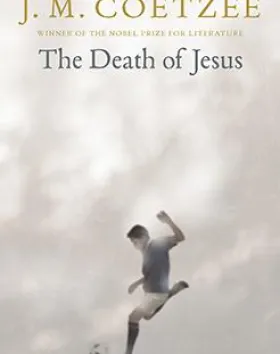
The Death of Jesus – J. M. Coetzee
The Death of Jesus
Shortlist year: 2020
Shortlist category: Fiction
Published by: Text Publishing
After 'The Childhood of Jesus' and 'The Schooldays of Jesus', J. M. Coetzee completes his trilogy with a new masterwork, 'The Death of Jesus'.
David has grown to be a tall ten-year-old. He is a natural at soccer, and loves kicking a ball around with his friends. His father and dog usually watch. His mother works in a fashion boutique. One day Julio Fabricante, the director of a nearby orphanage, invites David and his friends to form a proper soccer team. David decides he will leave his parents to live with Julio. Before long he succumbs to a mysterious illness.
About the author
J. M. Coetzee
J. M. Coetzee was the first author to win the Booker Prize twice and was awarded the Nobel Prize for Literature in 2003.
Judges’ comments
'The Death of Jesus' is the conclusion of J. M. Coetzee's trilogy about a child, apparently exceptional, who is known simply as David. Having eschewed conventional schooling and rejected his surrogate parents, Simón and Inés, David succumbs to a rare illness that quickly and unexpectedly proves fatal to him. Seen through the eyes of Simón, whose affection for the child is seldom expressed yet all encompassing, this is a compelling exploration of love and loss. Throughout the carefully controlled and seemingly cool narrative, Coetzee's prose is exquisite: sparse and crisp and sharp. Bubbling under the linguistic restraint, however, is a bristling, burning rawness. This is what gives the work its power, allowing the reader to fully engage with Simón's contained and sometimes wordless grief. In questioning the legacy and meaning of a life so prematurely ended, 'The Death of Jesus' offers a powerful meditation on the intersection of love, alienation, estrangement and grief.

The Weekend – Charlotte Wood
The Weekend
Shortlist year: 2020
Shortlist category: Fiction
Published by: Allen & Unwin
Four older women have a lifelong friendship of the best kind: loving, practical, frank and steadfast. But when Sylvie dies, the ground shifts dangerously for the remaining three. Can they survive together without her?
'The Weekend' explores growing old and growing up, and what happens when we're forced to uncover the lies we tell ourselves. Sharply observed and excruciatingly funny, this is a jewel of a book: a celebration of tenderness and friendship that is nothing short of a masterpiece.
About the author
Charlotte Wood
Charlotte Wood has been described as 'one of our most original, provocative writers'. She is the author of six novels and two books of non-fiction. Her bestselling novel, 'The Natural Way of Things', won the 2016 Stella Prize, the Indie Book of the Year and Indie Book Award for Fiction, was joint winner of the Prime Minister's Literary Award for fiction, and was published throughout Europe, the United Kingdom and North America. She has been twice shortlisted for the Miles Franklin Literary Award, as well as many others for this and previous works.
Judges’ comments
Charlotte Wood's meticulously crafted and beautifully written novel concerns three friends, now in their 60s and 70s, who meet over Christmas at the holiday house that once belonged to their late friend Sylvie, in order to clean it out and ready it for sale. But with Sylvie gone, the dynamics of the group have changed, and as they see the signs of old age showing in each other and face its myriad insecurities and fragilities, they begin to irritate each other in potentially disastrous ways. In this insightful, warm-hearted, and often very funny book, Wood does not shy away from the harsh realities of the ageing process. In essence, however, Wood's message is one of optimism: keep trying and refuse to give up, live life fully and support one another while you face whatever comes next.
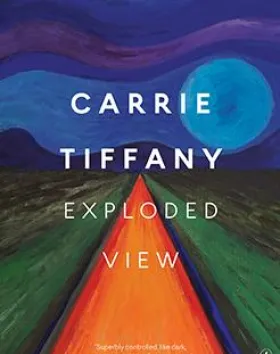
Exploded View – Carrie Tiffany
Exploded View
Shortlist year: 2020
Shortlist category: Fiction
Published by: Text Publishing
In the late 1970s, in the forgotten outer suburbs, a girl has her hands in the engine of a Holden. A sinister new man has joined the family. He works as a mechanic and operates an unlicensed repair shop. The family is under threat. The girl reads the Holden workshop manual for guidance. She fights the man at the place where she believes his heart lives—in the engine of the car.
Spare, poetic and intensely visual, 'Exploded View' is the powerful new novel from one of Australia's most celebrated writers and winner of the inaugural Stella Prize.
About the author
Carrie Tiffany
Carrie Tiffany spent her early twenties working as a park ranger in Central Australia. Her first novel, 'Everyman's Rules for Scientific Living' (2005), was shortlisted for the Orange Prize, the Miles Franklin Literary Award, the Guardian First Book Award and the Commonwealth Writers' Prize, and won the Dobbie Award and the WA Premier's Award for fiction. 'Mateship with Birds' (2011) was also shortlisted for many awards including the Prime Minister's Literary Awards and won the inaugural Stella Prize and the Christina Stead Prize for Fiction in the NSW Premier's Literary Awards.
Judges’ comments
Carrie Tiffany's intense short novel 'Exploded View' is an artful x-ray of a teenage girl's life in 1970s suburban Perth. The unnamed narrator shares her experiences in fragments, through the constantly spinning prism of her quirky mind. Her stream-of-consciousness switches between naivety and knowingness, and is electrified by Tiffany's honed, poetic prose. We see details of the girl's days at school, at home and in her stepfather's car repair shop. We glimpse obliquely her damage at his hands. In the novel's clever metaphor, we watch her escape mentally into the pages of a Holden manual and physically by taking cars on the road. She is at once a victim and a steely young woman bursting into her own sense of self. With psychological insight and ironic humour Tiffany builds a dark, thrilling, timeless vision of what it takes to be female.
Poetry
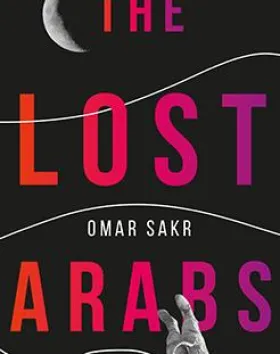
WINNER: The Lost Arabs – Omar Sakr
The Lost Arabs
WINNER
Shortlist year: 2020
Shortlist category: Poetry
Published by: University of Queensland Press
Visceral and energetic, Omar Sakr's poetry confronts notions of identity and belonging head-on. Braiding together sexuality and divinity, conflict and redemption, 'The Lost Arabs' is a seething, urgent collection from a distinct new voice.
About the author
Omar Sakr
Omar Sakr is a bisexual Arab-Australian poet. His debut collection, 'These Wild Houses' (2017), was shortlisted for the Judith Wright Calanthe Award and the Kenneth Slessor Prize. His poetry has been published in English, Arabic, and Spanish, in numerous journals and anthologies. He placed runner-up in the Judith Wright Poetry Prize, and has also been shortlisted for the ACU Poetry Prize, the Story Wine Prize, and the Fair Australia Poetry Prize. Omar has performed his work nationally and internationally.
Judges’ comments
The vital, energy-driven poems in this collection speak with a clear and fearless voice, a voice that is often passionate and sometimes angry, but always lucid and warmly human. Omar Sakr, an Arab-Australian-born poet, writes of things that concern us all: love, fear, family, exile, sex, culture, and war. He explores the themes of freedom and violence, of banishment and forgiveness, of the realities of the body and the idea of home. These poems are at once complex and accessible, using a wide range of poetic techniques and forms, and employing richly evocative language. They emphasise the interconnectedness of human affairs: sexuality and spirituality, ethnicity and identity, courage and terror. Some of them are grounded in rage, others in compassion and gentleness, but all of them acknowledge the complexities of their subject matter, and many of them are works of great subtlety and beauty.

The Future Keepers – Nandi Chinna
The Future Keepers
Shortlist year: 2020
Shortlist category: Poetry
Published by: Fremantle Press
The poems in 'The Future Keepers' honour ecosystems and the custodians of future ecologies. They navigate the poet's own embodied experiences of change and succession—of family, community and place. From the research scientists, gardeners, birds and plants of Kings Park, to the activism and ecosystems of the Beeliar Wetlands, to the poet's own inherited landscapes, these poems evoke mutuality and exchange in speaking of the gifts we receive from being open to encounters with other species, and the reciprocity that these gifts imply.
About the author
Nandi Chinna
Nandi Chinna is a writer and environmental activist. Nandi has written a PhD on walking and the lost wetlands of Perth.
Judges’ comments
The six sections of 'The Future Keepers' are composed of poems that present lucid images of the natural world, focus on epiphanies, and balance narrative and lyric elements. The poems explore the relationships between humans and the environment, and humans and animals, as well as between First Nations people and more recent arrivals. These relationships culminate in the idea of the future, so vital to Chinna's poetics. The poems conceive of the natural world and generations of First Nations people as stretching back into deep time, and the importance of an awareness of the past in imagining a future. They dwell on specific and carefully-described locations: the sea on the way to Bald Island, Perth's Kings Park, and Wardandi Country, as well as on the fragility of the human body. Though the poems are beautifully transparent in their narratives and in their unfolding towards their final lines, the accretion of moments—both in dramatic scenes of protest and in quiet periods of contemplation—resonate far beyond each artfully-constructed poem.
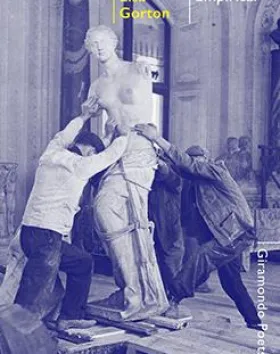
Empirical – Lisa Gorton
Empirical
Shortlist year: 2020
Shortlist category: Poetry
Published by: Empirical
In the hallucinatory first sequence of 'Empirical', Lisa Gorton seeks to understand how the feeling for place originates, and how memory and landscape fold in and out of each other. The collection then opens up into poems that track through chains of influence and a phantasmagoric procession of images, the trade between empire, commodities and dreams of other places. Through this method, landscapes are mirrored and refracted in the contemporary baroque style for which Gorton is celebrated.
About the author
Lisa Gorton
Lisa Gorton has a PhD on the poetry of John Donne from the University of Oxford. She is a poet and novelist, essayist and reviewer. Her first poetry collection 'Press Release' won the Victorian Premier's Award for Poetry; her second, 'Hotel Hyperion' was awarded the Philip Hodgins Memorial Medal. Her novel 'The Life of Houses' was the joint winner of the 2016 Prime Minister's Award for fiction. She is the author of 'Cloudland', a novel for children.
Judges’ comments
Lisa Gorton's 'Empirical' is a collection of poems that opens up a distinctively imagined world of urban Melbourne landscape and life. In long, carefully-paced lines Gorton shows us someone thinking about the entirely unremarkable world around her: factories, train lines, building rubble, tyre tracks, milkweed. Her view is empirical, privileging the evidence of the senses, rather than some poetic idea of landscape or fine feeling. These poems are like clear panes of glass on someone seeing and thinking, partly because of the pinpoint accuracy of individual words, partly because of the unencumbered syntax. In another sense of 'empirical,' the collection also includes documentary poems about the colonial history of Melbourne's modern civic space, full of careful quotation, catalogues of people and language from the past, as well as geographical references. These are poems that seem free of any predictable topic or theme, open to the immediacy of a perceptive mind.

Birth Plan – LK Holt
Birth Plan
Shortlist year: 2020
Shortlist category: Poetry
Published by: Vagabond Press
Birth Plan, LK Holt's fourth full-length collection is a generous, sharp-edged, technically masterful and expansive collection from one of Australia's foremost female poets. These poems are transformative, fiercely feminist, unrelenting in their clarity, and display a rare mastery of the musicality of language. Exploring the realities of mothering and loving in the late Anthropocene, Holt's work is rigorous in its exploration and evocation of psychological truths and half-truths. Fearless and darkly humorous, these are poems that turn on a phoneme and give full life and song to the shimmering uncertainties and hard realities of selfhood.
About the author
LK Holt
LK Holt lives in Melbourne, Australia. Her previous full-length collections are 'Man Wolf Man' (2007), 'Patience, Mutiny' (2010), and 'Keeps' (2014). She is a recipient of the Kenneth Slessor Prize and the Grace Leven Prize, and has been longlisted for the Literature Society Gold Medal.
Judges’ comments
Linguistically supple and engaged in experimentation with language, Holt's poems take the reader to locations as diverse as the Arapiles, Kangaroo Island and Barcelona. While apparently encompassing such experiences as childbirth, marriage, raising children and the death of a parent, Holt's collection explores too the curiosities of the natural world, juxtaposing human culture, in the form of music and art, with animals and birds. The poems connect the present with a long history of western artistic production. They place art and music in proximity with physical experiences, while also interrogating life with technology: the ubiquity of mobile electronic devices and Siri. Formally ranging from prose poems to sonnets that challenge readers' expectations about rhyme and rhythm, the poems in this volume contain arresting imagery. While titles are as diverse as 'She was Told to Have a Birth Plan' and 'I Don't Know', each poem, with its extended metaphors and precise yet original language, drives towards a new and more complete view of contemporary life, and its connections to the past.
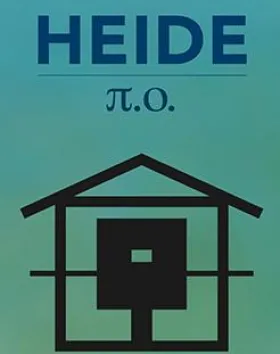
Heide – π.o.
Heide
Shortlist year: 2020
Shortlist category: Poetry
Published by: Giramondo Poets
'Heide' is an epic poem about history, painters, patrons—the people who made modern art happen in Australia, and those who opposed it. There is a particular focus on the artists gathered around Sunday and John Reed at Heide in Melbourne. The poet's extraordinary technique—his use of historical facts, quotations, numbers, and the visual form of the poem—generates both the book's encyclopaedic reach, and its Anarchist perspective. The effect is one of exuberance and lightness. 'Heide' is emphatic in asserting the centrality of art to human experience.
About the author
π.o.
π.o. is a legendary figure in the Australian poetry scene, born in Greece and brought up in Fitzroy, the chronicler of Melbourne and its culture and migrations, a highly disciplined Anarchist who has worked as a draughtsman for forty years to support his family and his art. He is the publisher of 'Unusual Work' by Collective Effort Press, a long-time magazine editor, a pioneer of performance poetry in Australia, and the author of many collections, including 'Panash', 'Fitzroy Poems', 'Big Numbers: New and Selected Poems', and two epic works '24 Hours' and 'Fitzroy: The Biography'. 'Heide' completes this monumental trilogy.
Judges’ comments
π.o.'s 'Heide' is a poetic history of art in Australia seen from the viewpoint of Melbourne and Victoria. It stretches from the time of Cook's voyages to Aboriginal leader William Barak, whose portrait hangs in the Victorian Parliament, up to the bohemian set at Heide. Like a gigantic exhibition of portraits and scenes the book is epic in its ambitions for poetic form and for our understanding of the centrality of art in Australian life and history. In accessible, playful and always vibrant language each portrait or scene depicts individual artists, artists' family, friends and relations, wealthy art patrons, landscapes, cultural events or Modernist controversy. This series of poetic portraits builds up a democratic and powerfully imagined life of art in society, all moving towards the richly detailed and very personal depiction of the artists and patrons at Heide: John and Sunday Reed, Sidney Nolan, Albert Tucker, and Joy Hester.
Children's literature
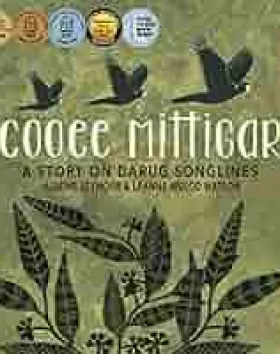
WINNER: Cooee Mittigar: A Story on Darug Songlines – Jasmine Seymour. Illustrator: Leanne Mulgo Watson
Cooee Mittigar: A Story on Darug Songlines
WINNER
Shortlist year: 2020
Shortlist category: Children's literature
Published by: Magabala Books
'Cooee Mittigar', meaning 'Come Here Friend', is an invitation to 'yana' (walk), on Darug Country. In this stunning picture book, Darug creators Jasmine Seymour and Leanne Mulgo Watson tell a story on Darug Songlines, introducing children and adults-alike to Darug 'Nura' (Country) and language.
Greeted by Mulgo, the black swan, readers are welcomed to 'Nura'. Journeying through the seasons, Mulgo describes the land, skyscape, birds, animals and totems. It is a gentle guide to how Darug people read the seasons, knowing when it is time to hunt and time to rest.
About the author
Jasmine Seymour
Jasmine Seymour is a Darug woman and descendant of Maria Lock, who was the daughter of Yarramundi, the Boorooberongal elder who had met Governor Phillip on the banks of the Hawkesbury River in 1791. Maria was the first Aboriginal woman to be educated by the Blacktown Native Institute. She was married to carpenter and convict, Robert Lock and their union resulted in thousands of descendants who can all trace their Darug heritage back past Yarramundi. Jasmine is a member of the Darug Custodian Aboriginal Corporation.
About the illustrator
Leanne Mulgo Watson
Leanne Mulgo Watson is a Darug artist-educator and is the daughter of Aunty Edna Watson. She has been a director of the Darug Custodian Aboriginal Corporation for many years. 'Cooee Mittigar' is her first book. She says "I had always wanted to create books to share our knowledge, as education is the key to our culture staying strong".
Judges’ comments
Whilst it is not in any way new for culture and languages to be introduced to young readers through picture books, 'Cooee Mittigar' by Darug women Jasmine Seymour and Leanne Mulgo Watson, approaches this objective in a style that is at once moving, informative, immersive, welcoming and potentially healing. After traversing the organic and tactile design and muted colours of the cover, the reader is led into a textually and visually rich world which, despite being in English and Darug, is in fact a love song to the natural beauty of wider Australia, and the proud traditions of its original inhabitants.
Unlike most other books featuring words from languages other than English, each page of text in this book includes its own mini-glossary, which offers the reader a more seamless experience of understanding the meaning in the text. This means that a very real sense of rhythm is achieved, which is in keeping with the full title: 'Cooee Mittigar—a Story on Darug Songlines'. However, it is in sharing of this book with the very young reader that the textual magic really happens: within the space of a few pages the child is taking in and understanding lines of text which include Darug words they only heard moments earlier. They are, quite literally, learning language as they read.
But of course 'Cooee Mittigar' is about far more than learning words of a language. It is a work of art that is beautiful and accessible, and with wonder on each new page for children and adults alike. In keeping with the promise contained in the full title, it lifts us on the rhythms of days and seasons, and carries us on a journey across Darug country and far beyond in a respectful, reverent paean to a land which two centuries ago boasted hundreds of distinct languages and dialects, most of which have since become extinct. In addition to the wonderful depictions of flora and fauna, the sky is a constant throughout this book, subtly reminding the reader of the enormity of what we still have, and its beauty that we can ill afford to spurn. It is noteworthy that the human inhabitants of the country are not explicitly depicted—they are simply woven into the text as custodians of and partners with the natural world. They are, in keeping with the invocation to 'tread softly on our lands' on the final page, part of the land without claiming dominion over it.
'Cooee Mittigar' is a book that the author and illustrator, publisher, Indigenous people, and in fact all Australians, should feel proud to acknowledge and share. As any teacher or communicator will readily explain, didacticism alienates one's audience, but story and beauty draw the audience closer, and facilitate understanding and acceptance. Any book which can reach our youngest minds with such gentleness and generosity of spirit should be applauded by all Australians.

Catch a Falling Star – Meg McKinlay
Catch a Falling Star
Shortlist year: 2020
Shortlist category: Children's literature
Published by: Walker Books
It's 1979 and high above Frankie Avery, one of the world's first space stations is tumbling Earthward. Rushing back with it are old memories. Things Frankie thought she'd forgotten. Things her mum won't talk about, and which her little brother Newt never knew. Only ... does he? Because as Skylab circles closer, Newt starts acting strangely. While the world watches the sky, Frankie keeps her eyes on Newt. Because if anyone's going to keep him safe, it's her. But maybe this is something bigger than splinters, spiders and sleepwalking. Maybe a space station isn't the only thing heading for calamity.
About the author
Meg McKinlay
Meg McKinlay is a children's writer and poet. She has published seventeen books for children, ranging from picture books through to young adult novels, and a collection of poetry for adults. Her work has won the Prime Minister's Literary Award, the Queensland Literary Award, the Davitt Award for Crime writing and the Aurealis Award for Speculative Fiction and been shortlisted for numerous other awards.
Judges’ comments
The last time twelve-year-old Frankie Avery saw her father was the night Skylab space station was launched. Six years later and Skylab is falling to earth, heading straight for Frankie's hometown in the south coast of Western Australia. As Skylab draws near, it unearths Frankie's grief and memories of her father, of their nights observing the infinite stars from their Space Shack, a shed with an opening in the roof. Skylab's descent also captures the attention and imagination of Frankie's scientifically gifted eight-year-old brother Newt, who is searching for answers of his own. While their mother works long hours as a nurse at a hospital, Frankie struggles under the weight of juggling school, looking after Newt and the silence surrounding her father's death.
Frankie's voice is wise and full of sharp observations. In her world a myriad of things fall from the sky, from birds, planes, shooting stars, to her father and her brother Newt. These insights into the various ways of 'falling' work beautifully to symbolise Frankie's lack of control over her life. She wisely states at one point ''I wonder what it would be like to be someone who thinks you actually have control over things. Who believes that if you want to, you can keep them from crashing to the ground''. Meg McKinlay's prose is poetic and lyrical, rich with imagery that captures Frankie's emotions while weaving an authentic landscape of Australia in the late 70s. Skylab's descent to earth serves as a catalyst for Frankie's healing and finding her way back to herself and her family.

Winter of the White Bear – Martin Ed Chatterton
Winter of the White Bear
Shortlist year: 2020
Shortlist category: Children's literature
Published by: Dirt Lane Press
'Winter of the White Bear' blurs the boundaries between fable, folk tale and social realism. It tells of a small forest bear who is orphaned and enslaved by a polar bear, then forced to fish in dangerous icy seas. When the little bear nearly drowns, an ancestral dream puts her in touch with her inner strength so that, with cunning and initiative, she finds a way to break away and return home to freedom.
About the author
Martin Ed Chatterton
Martin Chatterton was born in Liverpool (UK) and attended art college in London. He has worked in publishing and design as an author and illustrator. He has written many children's books for a variety of age ranges and has illustrated more than a hundred books for other writers, including Tony Bradman, Julia Donaldson and Michael Rosen. In 2017 he completed his PhD on the legacy of the 'Atlantic Slave Trade in Liverpool'. A full-time writer, illustrator, film-maker and performer, Martin also collaborates extensively with best-selling author James Patterson, and writes adult crime-fiction for screen under the name Ed Chatterton.
Judges’ comments
This is a powerful picture book, one which at first glance appears deceptively simple but which carries a strong political message. It is a striking example of an important component of the picture book genre in Australia, books for older readers. It deals with the issue of slavery and forced labour. Although many believe that slavery ended in the 19th century, in fact it still continues and this book emphasises the fact that slavery is not just something that happened in the past. The language used in the book is poetical and lyrical and the book as a whole reads almost like a fable.
Little Bear's father is killed by White Bear who then captures Little Bear and takes her far from her home and forces her to fish for him. Although Little Bear's father is killed early in the story, he remains an important figure in Little Bear's life and is the inspiration and guidance for her eventual escape.
The illustrations are stunning, depicting vast, lonely landscapes which highlight Little Bear's powerlessness and tiny size in contrast to both White Bear and the surrounding countryside. Seascapes also serve to emphasise Little Bear's dislocation from all she knows and her loneliness in this alien world. In addition, the illustrations reflect Chatterton's own fine art practice as well as his homage to some of his favourite artists.
Slavery and forced labour are group exercises, involving many people affecting people the world over. But this book effectively highlights the plight of the many forced into slavery by focussing on Little Bear who becomes emblematic of every person in this position just as White Bear is symbolic of all slavers. The book thus becomes a metaphor for slavery as a whole.
From the front cover, we have a picture of the unequal relationship between the two bears with the blurred outlines of White Bear towering over the tiny figure of Little Bear, alone in the wintry landscape. The journey Little Bear is forced to take is depicted by the vastness of the landscape she has to travel through, taking her further and further from everywhere she knows and from where she lived happily with her father before he was killed by White Bear. Gradually though, as she is forced to work harder and harder for White Bear, her helplessness gradually begins to turn into resourcefulness. Her escape plan is successful but leads to a moral dilemma of whether or not to save White Bear when he falls into the water and starts to drown. The scene will no doubt provoke much discussion amongst readers.
At the back of the book Chatterton explains that his home town of Liverpool was one of the largest slave ports in the world and one of the reasons he wrote this book is that his wife and children are descended from some of those slaves.

Cheeky Dogs: to Lake Nash and Back – Dion Beasley and Johanna Bell
Cheeky Dogs: to Lake Nash and Back
Shortlist year: 2020
Shortlist category: Children's literature
Published by: Allen & Unwin
Meet deaf artist, Dion Beasley, and the people he calls family. Dodging road trains by day and giant blue monsters at night, Dion weaves his way through life on an electric scooter, collecting rocks and dogs to make art. In his dreams he sees animals from overseas and his mother's country, Lake Nash, but every morning, without fail, he puts on his favourite socks and gets ready to feed the dogs. Is it time yet?
About the author
Dion Beasley
Dion Beasley is the story teller and illustrator of Cheeky Dogs. He lives in Tennant Creek and is well known across the Territory as the artist behind the much loved T-shirt brand, Cheeky Dogs. Dion's formal art career started in 2006 when the first Cheeky Dogs T- shirt line was launched. Since then, his reputation as an accomplished visual artist has grown from strength to strength. Dion's talents are particularly remarkable given he has muscular dystrophy and is profoundly deaf. In 2019 he received the Australia Council National Arts and Disability Award for an Emerging Artist.
About the author
Johanna Bell
Johanna Bell lives in Darwin with her partner, daughter and a backyard full of green tree frogs. Her writing career got off to a bumpy start when she was so busy composing a story in her head that she accidentally drove into the back of a taxi. It was while driving on a bumpy stretch of road outside Alice Springs that the beginnings of the Cheeky Dog books, took shape. Working with Dion has changed the way Johanna sees the world and tells stories. Johanna and Dion's books include 'Too Many Cheeky Dogs' and 'Go Home Cheeky Animals'.
Judges’ comments
'Cheeky Dogs: To Lake Nash and Back' is the memoir of Dion Beasley, a First Nations artist and author with profound deafness and muscular dystrophy, who tells the story of his childhood and youth in terms of the dogs that populated it. Camp dogs are ubiquitous in the author's life, whether in actuality, or on paper, and in 'Cheeky Dogs' they are as conspicuous by their presence as by their absence. Beasley describes in tangible detail the antics of dogs in packs, dogs alone, dogs as companions, dogs as attackers and dogs as art. As a child, Beasley is moved from place to place, home to home, family to family, town to town, but dogs held his life together, and dogs hold this narrative together.
'Cheeky Dogs' leaps back and forth through time, sometimes describing a moment in early childhood, then covering several changes of residence in a few brief lines, then looking back at an even earlier childhood memory. Beasley plays with form and content, beguiling the reader into a new way of seeing his world. Through verbal and visual repetition, vibrantly energetic naïve artwork, onomatopoeia, and simple, straightforward prose, the author weaves a sense of spontaneous immediacy as he records terror, warmth, excitement, grief, toothache. Broad overviews alternate with tiny details, such as the sight and smell—but not the sound—of rain on the roof as he, a small child, is stitched together after being mauled by dogs. The illustrations are a seamless cohesion of multi-media pieces, each an outstanding example of vibrant 'outsider' art, rendered with freshness and spirit, power and cohesion to offer delight and revelation with each turn of the page.

One Careless Night – Christina Booth
One Careless Night
Shortlist year: 2020
Shortlist category: Children's literature
Published by: Black Dog Books an imprint of Walker Books
Where the mist swallows mountains and winds whisper through ancient trees, a mother and her pup run wild and free. They hunt, but they are also hunted. Carted away. Sold for bounty. And then, one careless night … The last thylacine is gone.
The beautiful but heartbreaking story of Australia's last thylacine (Tasmanian tiger), which died in captivity.
About the author
Christina Booth
Author and illustrator Christina Booth works from her bush studio in Tasmania, Australia. Trained as a teacher and painter, she loves that she makes up stories and colours for a living. Christina started her literary career illustrating for great Australian authors such as Max Fatchen, Colin Thiele, Christobel Mattingley and Jackie French. Many of Christina's previous books are award-winning, including the Environment Award, CBCA Honour Book and CBCA Notables.
Judges’ comments
'One Careless Night' is an extraordinary picture book that speaks to the endangerment endemic we face in Australia. It welcomes young readers to empathise with a thylacine as it is captured and neglected in captivity, confronting us to consider our own actions.
Goose-bump inducing poetic prose throughout prompts the reader to lament the loss of the great Tasmanian Tiger. Accompanying the text are intentionally monochromatic illustrations that carefully interlace foregrounded ferns with crow feathers, distancing the audience from the thylacine and welcoming us into a very real world of fear and loss. The exquisite cover sees the thylacine exit stage right on the front, without re-appearing on the rear cover; instead she is replaced with a wash of darkened textures and we are made hauntingly aware that 'the last thylacine is gone'.
'One Careless Night' is the deeply moving call to action we need in an age of extinction in our nation.
Australian history
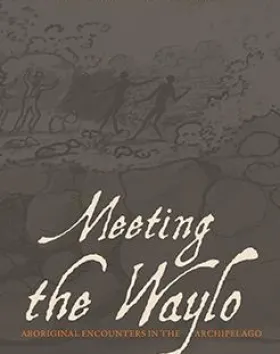
WINNER: Meeting the Waylo: Aboriginal Encounters in the Archipelago – Tiffany Shellam
Meeting the Waylo: Aboriginal Encounters in the Archipelago
WINNER
Shortlist year: 2020
Shortlist category: Australian history
Published by: University of Western Australia Publishing
'Meeting the Waylo' is a history of story-making about the experiences of Migeo, Boongaree and Bundle, three Indigenous Australians who were intermediaries on board maritime expeditions in the early nineteenth century. These Indigenous men travelled to the archipelagos of the north-west of Western Australia, where they became central figures in encounters between the crew and local Indigenous groups onshore.
About the author
Tiffany Shellam
Tiffany Shellam lectures in History at Deakin University. She works collaboratively with Noongar people and historians, museum curators, archivists and librarians to critique the archives, unearthing hidden and alternative histories generated by encounters between Indigenous people and European explorers and setters in the early nineteenth century. Her first book, 'Shaking Hands on the Fringe: Negotiating the Aboriginal World at King George's Sound', was published by UWA Publishing in 2009.
Judges’ comments
Relying on a carefully nuanced argument based on a minute and critical reading of the sources, Shellam explores the roles of three Indigenous men- Migeo, Boongaree and Bundle- in mediating between the leaders of Phillip Parker King's second hydrographic expedition (1838-43) to the north west coast of Australia and the local Waylo people.
But this book is also a case study in how historians can use sources written by Europeans to illuminate Indigenous views and understandings, because Shellam refuses to take these documents at their face value. Instead, with a fine critical eye, she looks beyond the Eurocentric cultural assumptions underpinning them to determine a more subtle understanding of the cultures both of the mediators and the Waylo. In the process she also narrates a more complicated set of stories of Indigenous-European encounters. Both in its approach and content this is a path breaking book.
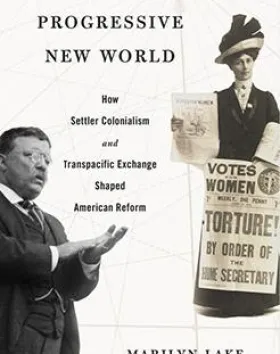
Progressive New World: How Settler Colonialism and Transpacific Exchange Shaped American Reform – Marilyn Lake AO
Progressive New World: How Settler Colonialism and Transpacific Exchange Shaped American Reform
Shortlist year: 2020
Shortlist category: Australian history
Published by: Harvard University Press
In a bold argument, Marilyn Lake shows that race and reform were mutually supportive as Progressivism became the political logic of settler colonialism at the turn of the 20th century. She points to exchanges between American and Australasian reformers who shared racial sensibilities, along with a commitment to forging an ideal social order.
About the author
Marilyn Lake AO
Marilyn Lake, AO, is Professorial Fellow in History at the University of Melbourne.
Judges’ comments
Drawing on the term 'settler colonialism' to define a shared Australian and American characteristic this book explores the Progressive Movement as a transpacific crusade. Lake impressively maps how Australia progressivism, which emphasised the role of the state in improving the welfare of children, women and working people in general, influenced its United States counterpart, an influence that even extended to the movement's leader, 'Teddy' Roosevelt.
This is an innovative book that extends Australian history beyond our nation's defined boundaries, while at the same time challenging the widely accepted notion of American 'exceptionalism.'
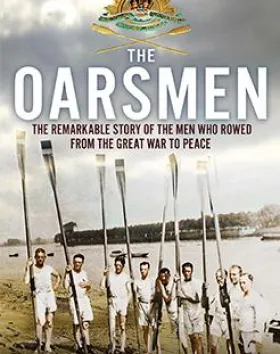
The Oarsmen: The Remarkable Story of the Men Who Rowed from the Great War to Peace – Scott Patterson
The Oarsmen: The Remarkable Story of the Men Who Rowed from the Great War to Peace
Shortlist year: 2020
Shortlist category: Australian history
Published by: Hardie Grant Books
'The Oarsmen' tells the story of the servicemen who survived the war to row for the coveted King's Cup at the 1919 Royal Henley Peace Regatta. Combining first-hand accounts with lively prose, this never-before-told story approaches the First World War from peacetime and illuminates history in vivid and compelling detail. Interweaving the soldiers' personal stories from before, during and after the war, 'The Oarsmen' paints a fascinating picture of how these men, and society, transitioned from an unprecedented war to a new sort of peace.
About the author
Scott Patterson
Scott Patterson is a director and filmmaker based in Australia. He has worked extensively across film, television, advertising and the theatre in his 30-year career. A keen oarsman himself, his documentary about the Royal Henley Peace Regatta will be released in 2019,
Judges’ comments
This is an extraordinary book, which carefully pieces together the previously untold, extraordinary story of how a rowing eight made up of physically and psychologically scarred AIF servicemen won the King's Cup at the 1919 Henley Regatta. Eschewing a narrative of nationalism this is a tale of the triumph of the human spirit.
Relying on careful research and using an understated prose style, Patterson explores the unassuming lives of these men in pre-war Australia as a prelude to detailing their experiences in the armageddons of Gallipoli, Pozieres and Ypres. In Patterson's narrative the Henley triumph by such a mismatched and damaged crew is almost miraculous, although his accounts of their difficult and sometimes tragic post war lives carefully tempers that understanding. In also speaking to the wider experiences of these servicemen in peace and war this is an inspiring book about human frailty, endurance and survival.

Sludge: Disaster on Victoria’s Goldfields – Susan Lawrence and Peter Davies
Sludge: Disaster on Victoria's Goldfields
Shortlist year: 2020
Shortlist category: Australian history
Published by: La Trobe University Press in conjunction with Black Inc.
Everyone knows gold made Victoria rich. But did you know gold mining was disastrous for the environment? Mining effluent, or 'sludge', contaminated three-quarters of Victoria's creeks and rivers and still affects our rivers and floodplains today. Children and animals drowned in sludge lakes. Sludge submerged Victoria's best grapevines near Bendigo, filled Laanecoorie Reservoir and flowed down from Beechworth over thousands of hectares of rich agricultural land.
'Sludge' is the compelling story of the forgotten filth that plagued nineteenth-century Victoria and how the battle against it helped lay the groundwork for the modern environmental movement.
About the author
Susan Lawrence
Susan Lawrence is a professor of archaeology at La Trobe University and has spent thirty years studying the goldfields. She is the author of 'Dolly's Creek: An Archaeology of a Victorian Goldfields Community' and, with Peter Davies, 'An Archaeology of Australia since 1788'.
About the author
Peter Davies
Peter Davies is a research fellow in archaeology at La Trobe University whose work focuses on the social, industrial and environmental archaeology of colonial Australia. His previous books include 'Henry's Mill: The Archaeology and History of a Forest Community' and 'An Archaeology of Australia since 1788', with Susan Lawrence.
Judges’ comments
Against the narrative that the story of the discovery and mining of gold in Victoria is an unqualified story of progress and prosperity Lawrence and Davies, relying on both extensive archival and field research, revive the forgotten story of how billons of litres of water used in the mining process carried in thousands of kilometres of channels, spread huge amounts of sludge through fertile river valleys, poisoning stock and ruining farmlands.
This book is a major contribution both to environmental history and historical archaeology. It is not only a history that illustrates past mistakes which have left an enduring environmental legacy but also speaks to a continuing need to address what remains a major contemporary ecological disaster.
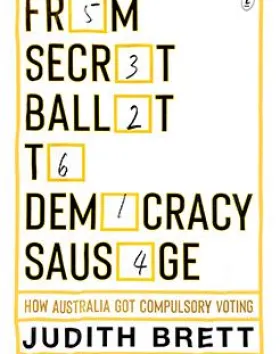
From Secret Ballot to Democracy Sausage: How Australia Got Compulsory Voting – Judith Brett
From Secret Ballot to Democracy Sausage: How Australia Got Compulsory Voting
Shortlist year: 2020
Shortlist category: Australian history
Published by: Text Publishing
It's compulsory to vote in Australia. Australia is one of a handful of countries in the world that enforce this rule, and the only English-speaking country that makes its citizens vote. Not only that, we embrace it. We celebrate compulsory voting with barbeques and cake stalls at polling stations, and election parties that spill over into Sunday morning. But how did this come to be: when and why was voting in Australia made compulsory? How has this affected our politics? And how else is the way we vote different from other democracies?
About the author
Judith Brett
Judith Brett is the author of 'Robert Menzies' Forgotten People' and emeritus professor of politics at La Trobe University. 'The Enigmatic Mr Deakin' won the 2018 National Biography Award, and was shortlisted in the Prime Minister's Literary Awards, the NSW Premier's Literary Awards, NSW Premier's History Awards and Queensland Literary Awards.
Judges’ comments
In this well written and intelligently argued book Brett draws together the diverse practices, policies and institutions that together constitute the Australian electoral system. Acknowledging the flaws in that system's operation she nevertheless argues with force and persuasion that it effectively protects the Australian democratic and constitutional processes. In demonstrating the continuing strength of the Australian electoral process she makes an invaluable contribution to Australian political history and provides the book's readers with an important lesson in citizenship and its privileges.
Non-fiction

WINNER: Sea People: The Puzzle of Polynesia – Christina Thompson
Sea People: The Puzzle of Polynesia
WINNER
Shortlist year: 2020
Shortlist category: Non-fiction
Published by: William Collins an imprint of HarperCollins Publishing
For more than a millennium, Polynesians occupied the remotest islands in the Pacific Ocean, an enormous triangle stretching from Hawaii to New Zealand to Easter Island. Sailing in large, double-hulled canoes, they were the first and, until the era of European discovery, the only people ever to have reached this part of the globe. Today, they are widely acknowledged as the world's greatest navigators.
But how did these ancient mariners find all these islands? A thrilling intellectual detective story, 'Sea People' combines the thrill of exploration, the wonder of pursuit, and the drama of a gripping historical puzzle.
About the author
Christina Thompson
Christina Thompson is the editor of Harvard Review and the author of 'Sea People', winner of the 2019 NSW Premier's General History Prize, and 'Come on Shore' and 'We will Kill and Eat You All: A New Zealand Story', which was shortlisted for the 2009 Douglas Stewart Prize for Non-fiction and the 2010 William Saroyan International Prize for Writing.
Judges’ comments
This book will become the standard account of where the Polynesian people came from and how they settled the Pacific. But that is not its only narrative for Thompson also relates a damning story of how the cultural and racial bias of Western explorers and later scholars led them to misunderstand the origins, nature and occupation history of Polynesians. With a neat sense of irony Thompson demonstrates how Polynesian oral traditions have proven to be more accurate than European discourses on the subject.
Thompson not only relates an important narrative but she does it in a compelling way. This is a book that is difficult to put down. Descriptions of her own travels to important sites of Polynesian migration and accounts of recent voyages duplicating those of ancient Polynesian mariners not only become fascinating stories in themselves but also allow her to reflect on Polynesian achievement, European folly and the tragedies that often resulted when the two civilisations clashed.

WINNER: Songspirals: Sharing Women’s Wisdom of Country through Songlines – Gay’wu Group of Women
Songspirals: Sharing Women's Wisdom of Country through Songlines
WINNER
Shortlist year: 2020
Shortlist category: Non-fiction
Published by: Allen & Unwin
'Songspirals' are sung by Aboriginal people to awaken Country, to make and remake the life-giving connections between people and place. 'Songspirals' are radically different ways of understanding the relationship people can have with the landscape.
For Yolngu people from North East Arnhem Land, women and men play different roles in bringing songlines to life, yet the vast majority of what has been published is about men's place in songlines. 'Songspirals' is a rare opportunity for outsiders to experience Aboriginal women's role in crying the songlines in a very authentic and direct form.
About the author
Gay'wu Group of Women
Gay'wu Group of Women is the 'dilly bag women's group', a deep collaboration between five Yolngu women and three non-Aboriginal women over a decade. They are all co-authors of 'Weaving Lives Together at Bawaka, North East Arnhem Land' and a book for young adults, 'Welcome to My Country'.
The group members are Merrkiyawuy Ganambarr-Stubbs, Banapuy Ganambarr, Djawundil Maymuru, Laklak Burarrwanga, Ritjilili Ganambarr, Sarah Wright, Kate Lloyd and Sandie Suchet-Pearson.

The Enchantment of the Long-haired Rat: A Rodent History of Australia – Tim Bonyhady
The Enchantment of the Long-haired Rat: A Rodent History of Australia
Shortlist year: 2020
Shortlist category: Non-fiction
Published by: Text Publishing
The fascinating story of a much-maligned and little-understood native Australian rodent. The long-haired rat breeds and spreads prodigiously after big rains. Its irruptions were plagues to European colonists, who feared and loathed all rats, but times of feasting for Aboriginal people.
Tim Bonyhady explores the place of the long-haired rat in Aboriginal culture. He recounts how settler Australians responded to it, learned about it and, occasionally, came to recognise the wonder of it. And he reconstructs its changing, shrinking landscape—once filled with bilbies, letter-winged kites and inland taipans, but now increasingly the domain of feral cats.
About the author
Tim Bonyhady
Professor Tim Bonyhady is one of Australia's foremost environmental and cultural historians. His many books include 'Images in Opposition: Australian Landscape Painting 1801-1890', 'Burke and Wills: From Melbourne to Myth', 'Places Worth Keeping: Conservationists', 'Politics and Law' and award winning 'The Colonial Earth'.
Judges’ comments
Arguing that the history of the long-haired rat is an allegory for the nation itself, Tim Bonyhady persuasively demonstrates how the decline in rat populations since the arrival of Europeans reflects a wider environmental disaster. Bonyhady notes that while the Aborigines saw the rat as a source of food, Europeans believed that they were conduits of disease. This negative attitude was reinforced by periodic rat plagues in rural Australia; with the result that even scientific practice was permeated by anti-rat prejudice.
Almost poetically Bonyhady maps a climate change and habitat reduction induced process of long-haired rat decline, which has rippled through the eco system and led to a population loss among the predators that feed on the rats. This is an unusual history but one filled with sharp insights about the fragility of the natural environment and intelligent arguments setting out the consequences of further disruption to the balance. On the one hand this is a fascinating history of a little known Australian rodent. On the other it is an ode to what we have lost and what we still have to lose.
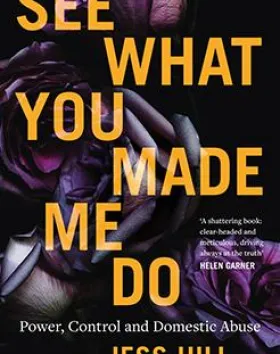
See What You Made Me Do: Power, Control and Domestic Abuse – Jess Hill
See What You Made Me Do: Power, Control and Domestic Abuse
Shortlist year: 2020
Shortlist category: Non-fiction
Published by: Black Inc.
Domestic abuse is a national emergency: one in four Australian women has experienced violence from a man she was intimate with. Too often we ask the wrong question: why didn't she leave? We should be asking: why did he do it?
Jess Hill puts perpetrators—and the systems that enable them—in the spotlight. Combining forensic research with riveting storytelling, 'See What You Made Me Do' radically rethinks how to confront the crisis of fear and abuse in our homes. Critically, it shows that we can drastically reduce domestic violence—not in generations to come, but today.
About the author
Jess Hill
Jess Hill is an investigative journalist who has been writing about domestic violence since 2014. Prior to this, she was a producer for ABC Radio, a Middle East correspondent for The Global Mail, and an investigative journalist for Background Briefing. She was listed in Foreign Policy's top 100 women to follow on Twitter, and her reporting on domestic violence has won two Walkley awards, an Amnesty International award and three Our Watch awards.
Judges’ comments
Recognising that domestic abuse is a pervasive and misunderstood crisis in Australia, this book sets out to understand why it occurs and to propose a sophisticated collection of potential solutions.
Hill interweaves her extensive research with illuminating and sometimes terrifying individual stories, ensuring that this is not just a sociological account, but also a deeply moving human story. This investigation recasts the questions that need to be asked about domestic abuse and invites the reader to reconsider how we think about both perpetrators and their victims.
This is a vitally important book that in setting out the endemic nature of domestic abuse, also provides ways forward while also warning of the cost of doing too little, too late.

Hearing Maud: A Journey for a Voice – Jessica White
Hearing Maud: A Journey for a Voice
Shortlist year: 2020
Shortlist category: Non-fiction
Published by: University of Western Australia Publishing
'Hearing Maud' is a work of creative non-fiction that details experiences of deafness after losing her hearing at age four. It charts how she was estranged from people and turned to reading and writing for solace.
Central to her narrative is the story of Maud, the deaf daughter of 19th century novelist Rosa Praed. Although Maud was deaf from infancy, she was educated at a school which taught her to speak rather than sign, a mode difficult for someone with little hearing. Through Maud's story, Jessica began to understand her own experiences of deafness and their contribution to her life.
About the author
Jessica White
Jessica White was raised in north-west NSW and, at age four, lost most of her hearing from meningitis. An avid reader and writer, she journeyed from her country school of 100 pupils to publishing her first novel at age 29, before graduating with a PhD from the University of London. Her short fiction, poetry and essays have appeared in Australian and international literary journals including Review of Australian Fiction, Overland, Island, Griffith Review, Westerly and Southerly. She is currently an academic at The University of Queensland. 'Hearing Maud' is her third book.
Judges’ comments
In this memoir Jessica White begins with the story of how she lost her hearing from contracting meningitis as a child. Receiving little support that would allow her to communicate with other people her life became an odyssey in search of her own voice, an odyssey that was assisted by her reading of the novels of Rosa Praed and learning how Rosa's deaf daughter Maud coped and communicated by writing voluminous letters.
The strength of this book lies not only in the telling of this unusual odyssey, but also in the evocative way White describes some of her specific experiences relating to her deafness and sense of alienation. Her description of the home-sickness she experienced in London will resonate with many readers. But this is also an intriguing and original memoir that speaks of the relevance of the past, in the form of Rosa and Maud, not only to White but also to many contemporary Australians.
Young adult literature
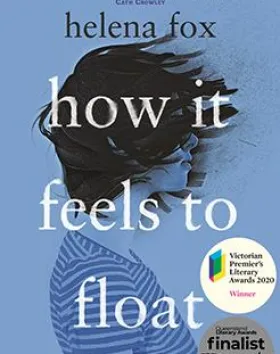
WINNER: How it Feels to Float – Helena Fox
How it Feels to Float
WINNER
Shortlist year: 2020
Shortlist category: Young adult literature
Published by: Pan Macmillan
Biz knows how to float. She has her people, posse, her mum and the twins. She has Grace. And she has her dad, who tells her about the little kid she was, and who shouldn't be here but is. So Biz doesn't tell anyone anything. Not about her dark, runaway thoughts, not about kissing Grace or noticing Jasper, the new boy. And she doesn't tell anyone about her dad. Because her dad died when she was seven. And Biz knows how to float, right there on the surface—normal okay regular fine.
About the author
Helena Fox
Helena Fox mentors and runs writing workshops for young people, and is a graduate of the MFA Program for Writers at Warren Wilson College in the U.S. Helena has travelled and lived all around the world, but of all her adventures, working with young people and helping them find and express their voice has brought her the greatest joy. 'How It Feels to Float' is her debut novel.
Judges’ comments
'How it Feels to Float' is a debut novel by Helena Fox. It is a beautifully written, poetic and heart-breaking portrayal of grief, trauma, guilt and mental illness. Biz, the main character, is endearing, nuanced and convincing. Her isolation and disassociation from reality is sensitively handled. She has constructed a world in which she believes she doesn't need to tell anyone anything as she tries to convey an image of self-sufficiency. The title refers to Biz's feeling she can float above everything and survive; as she tells teachers and counsellors and anyone else who cares to ask she's 'fine'. The first-person narrative allows the reader to develop a special rapport with Biz and understanding of her relationships with others. There is a gradual revealing of the background to Biz's state of mind and the author uses each word and wonderfully-crafted sentence to portray an unravelling of the tapestry of Biz's grief and depression, fusing the past and present until she is holding on by a thread. The disclosure of her father's death, when she was a little girl, and her feeling of guilt about this is distressing and revealing.
As readers, we find out just how long Biz has been using this ability to 'float' to cover up her real feelings. For her, a relatively minor event escalates overnight into something major. The episode of her breakdown is shocking and believable and the author's skill makes the reader feel Biz's pain. The road trip that Biz and her friend Jasper take is a clever authorial device for bringing about this climactic deterioration in Biz's mental health. Although confronting and hard to read at times, it is ultimately a book about hope, resilience and survival.
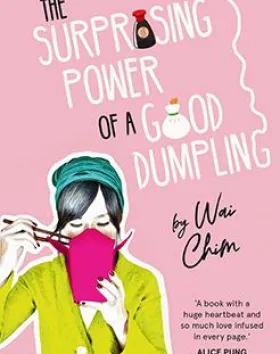
The Surprising Power of a Good Dumpling – Wai Chim
The Surprising Power of a Good Dumpling
Shortlist year: 2020
Shortlist category: Young adult literature
Published by: Allen & Unwin
Anna Chiu has her hands full looking after her siblings and helping out at her dad's restaurant, all while her mum stays in bed. Dad's new delivery boy, Rory, is a welcome distraction and even though she knows that things aren't right at home, she's starting to feel like she could just be a normal teen.
But when Mum finally gets out of bed, things go from bad to worse. And as Mum's condition worsens, Anna and her family question everything they understand about themselves and each other.
A nourishing tale about the crevices of culture, mental wellness and family.
About the author
Wai Chim
Wai Chim is a first-generation Chinese-American from New York City. She grew up speaking Cantonese at home and absorbing Western culture through books, TV and school. She spent some time living in Japan before making Sydney, Australia, her permanent home. Her previous books include the 'Chook' series and 'Shaozhen', part of the 'Through My Eyes: Natural Disaster Zone' series. Her novel 'Freedom Swimmer' was shortlisted for the inaugural Readings Young Adult Book Prize and the Sakura Medal, and was a Children's Book Council Notable Book. In addition to writing, Wai works as a digital producer for Starlight Children's Foundation.
Judges’ comments
Anna Chiu's mother suffers from mental illness and Anna is often required to take on parental duties and care for her younger brother and sister, Lily and Michael. Their father is in denial and refuses to recognise that his wife's illness is serious, even when she retreats to her bedroom for months at a time. The issue of mental illness is well-handled and the depiction of the perceived stigma of mental health in families with an Asian background is culturally sensitive.
The family runs a restaurant and the presence and importance of food runs throughout this book. Beyond the actual nourishment that food supplies, there is a real feeling throughout the book of the non-physical, almost spiritual nourishment gained from consuming food served by family and eaten with the family.
Anna is an endearing and nuanced character. She is determined and resilient, coping with bullying and racism. She is also trying to straddle two cultures and dealing with the complexities of being the family's main carer, while also expected by her father to be submissive. Anna is the one the younger children call on when something goes wrong at home and sometimes the responsibility is overwhelming and there are times when Anna simply wants to be a 'normal' teenager. Schoolwork can also be a problem as she copes with the other demands on her time but her friendship with Rory helps with that as he supports her homework with Walt Whitman and Shakespeare.
Trust is another strong theme throughout the book as Anna's father must learn to trust her, Rory develops sufficient trust in Anna to reveal his own background and Anna must learn to trust all those around her to give her support and for her to acknowledge that she can gradually allow others to take over some of the responsibilities she has been burdened with.
The book also celebrates love in its many forms. Anna loves her family, despite all the challenges that brings, she loves the family's restaurant and wants it to succeed and she loves the other workers in the restaurant—workers who give her support and affection in return. These peripheral characters are all strongly drawn and some, like Ah Jeff, provide moments of comic relief. Then there is Rory, her first boyfriend, who doesn't come from the same cultural background as she does but provides a loving relationship nonetheless.
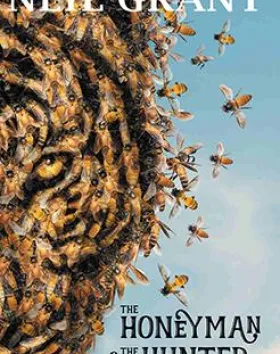
The Honeyman and the Hunter – Neil Grant
The Honeyman and the Hunter
Shortlist year: 2020
Shortlist category: Young adult literature
Published by: Allen & Unwin
When sixteen-year-old Rudra Solace dredges up a long-hidden secret in his father's trawl net, his life in the sleepy fishing village of Patonga shifts dramatically. It is not long before Rudra is leaving Australia behind, bound for India on a journey of discovery and danger.
A wonderfully compelling tale of belonging and loss, of saltwater and mangroves, of migration and accepting change; a story of decisions that, once made, break through family histories like a cyclone swell.
About the author
Neil Grant
Neil Grant was born in Glasgow, Scotland. He spent many years slouching through Europe and Asia with a stack of notebooks until, in 2001, Allen & Unwin agreed to publish his first novel, 'Rhino Chasers'. This was followed by 'Indo Dreaming' in 2005, which saw him researching traditional whale-hunting, surf culture and two-minute noodles in Indonesia. In 2009, he travelled to Afghanistan to gather material for a book on asylum seekers, a journey that changed his life; 'The Ink Bridge' was published in 2012. 'The Honeyman and the Hunter' is based partly in India—the birthplace of his mother.
Judges’ comments
'The Honeyman and the Hunter' is an intricate and elegantly crafted novel that celebrates the rich potential of language, and that utilises the power of the novel to express rather than expound. The story explores identity and belonging, two common enough tropes in young adult fiction, but these ideas are granted new relevance with a combination of terse, nuggety dialogue, minimal internal discourse, and a wealth of succinct and expressive imagery.
Rudra is as Australian as the surf, and he belongs as surely to the beachside suburb of Patonga as does the creek flowing into the bay. That his mother is from India should be irrelevant, as should the fact he is named after an Indian deity, so when others call him 'curry-muncher' and tell him to 'go back to where he came from', he has to stifle 'the big wrongness punching through doors inside him'. That his father is a brute is less irrelevant, but Rudra has learnt to both dodge and sometimes even find a way to justify his father's cruelty.
Rudra doesn't talk much. He often can't find the speech marks to put around what he feels, and though he is largely taciturn, remains silent about his emotions and brushes off probing questions, he nonetheless feels intensely. But instead of focusing on the dissection of Rudra's state of mind and heart, 'The Honeyman and the Hunter' harnesses the imagery of water to suggest emotion. Ripples, waves, surf, waterways, creeks, currents and tides; water as barrier, water as friend, water as refuge, water as danger, water as cleanser, and water as concealer of a hidden past are intensely integral to meaning throughout this novel. When Rudra is impelled to face the materiality of his Indian heritage by the unexpected arrival of his tiny but formidable grandmother, he travels to India to encounter a whole new perception of water and, ultimately, of himself.
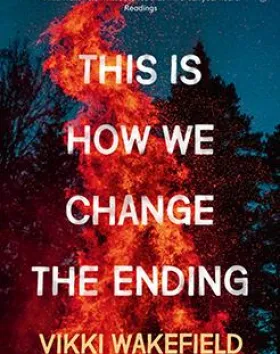
This Is How We Change the Ending – Vikki Wakefield
This Is How We Change the Ending
Shortlist year: 2020
Shortlist category: Young adult literature
Published by: Text Publishing
Sixteen-year-old Nate McKee is doing his best to be invisible. He's worried about a lot of things—how his dad treats Nance and his twin half-brothers; the hydro crop in his bedroom; his reckless friend, Merrick.
Nate hangs out at the local youth centre and fills his notebooks with things he can't say. But when some of his pages are stolen, and his words are graffitied at the centre, Nate realises he has allies. He might be able to make a difference, change his life, and claim his future. Or can he?
About the author
Vikki Wakefield
Vikki Wakefield writes realist fiction for young adults. Her work explores coming-of-age, family, class, relationships and the lives of contemporary teens. Her novels 'All I Ever Wanted', 'Friday Brown', 'Inbetween Days' and 'Ballad for a Mad Girl' have been shortlisted for numerous awards.
Judges’ comments
In Vikki Wakefield's fifth novel for young adults she plunges headlong into well-trodden young adult territory—the dead-end country town, the absent parent, the blended family, the boy who can't live up to the masculinist expectations of his elders, the shame of being clever in a world of crushing underachievement, the jaded teacher doing his best to boost the main character out of their funk of learned inadequacy—each of these has been explored many times over, but rarely have they resulted in a novel as fine as this.
'This Is How We Change the Ending' embraces all of these tropes and, rather than taking the path most travelled, crashes into the undergrowth, using them like machetes to clear a path to that great emotional motivator and agent for change—hope. Wakefield achieves this through her razor-sharp wit and instinct for subversion, as well as a sense of restraint around the threat of male violence that lurks in the corners. Her ability to take a moment and make it light even whilst shadows drift menacingly past the windows is matched only by her gift for characterisation and, even more impressively, dialogue. There are few writers who can create such dazzling conversation from the most unremarkable situations, all the while raising questions in the mind of the reader, advancing the story, and bringing a smile to the face with the charming effortlessness of it all, even as the tension of Nate's Sisyphus-like existence continues to quiver in the middle distance.
This is a novel which lives on in the mind long after it has been closed. Yes, in its composite parts it is a story that has been told before. But the execution of the elements, and the destination to which it leads, make it utterly remarkable.
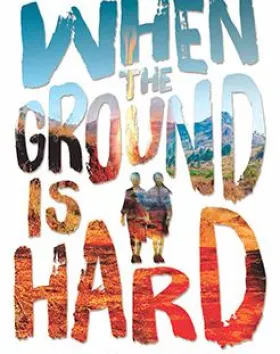
When the Ground is Hard – Malla Nunn
When the Ground is Hard
Shortlist year: 2020
Shortlist category: Young adult literature
Published by: Allen & Unwin
Adele loves being one of the popular girls at Keziah Christian Academy, with her best friend Delia at her side. Then Delia dumps her for a new girl with more money, and Adele is forced to share a room with Lottie, the school pariah.
As they share Jane Eyre, Lottie's gruff exterior and honesty grow on Adele, and together they take on bullies and protect each other from the vindictive and prejudiced teachers. When a boy goes missing on campus, Adele and Lottie must work together to solve the mystery, in the process learning the true meaning of friendship.
About the author
Malla Nunn
Born and raised in Swaziland on the far edges of the British Empire, Malla Nunn attended a boarding school specially set up for 'mixed race' children. After her family migrated to Australia to escape apartheid, Nunn graduated with a double degree in English and History and then earned a Master of Arts in Theatre Studies from Villanova University. Faced with a life of chronic under-employment, she dabbled in acting and screenwriting. She married in a traditional Swazi ceremony. Her bride price was eighteen cows.
Judges’ comments
'When the Ground Is Hard' is the book we need now, as, around the world, we awaken to race matters with heart. It explores the marginalisation of people of 'mixed race' and the complexities of race, gender and class with an unparalleled poetic prowess.
Championing matriarchal strength, this engrossing narrative welcomes the reader into the isolated world of a Swaziland boarding school, where two girls from different realms battle bullies, teachers, fires and racism, while creating a sanctuary over a shared copy of 'Jane Eyre'.
Nunn's profound ability to shape compelling characters and relationships allows the reader to witness the truest meaning of friendship and family and her intricately woven ancestral stories and proverbs made this the sort of book that lives on in the reader's thoughts after it is finished. 'When the Ground is Hard' is a poignant coming-of-age novel and an important addition to Australian young adult literature.


